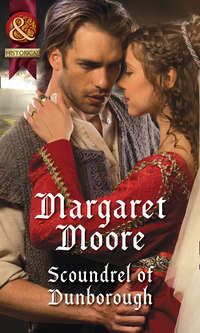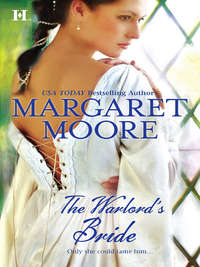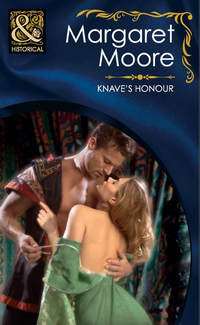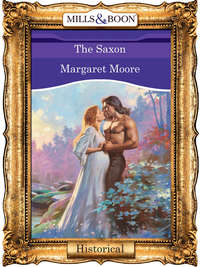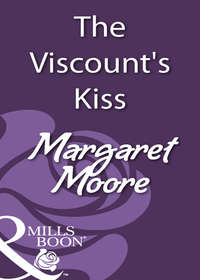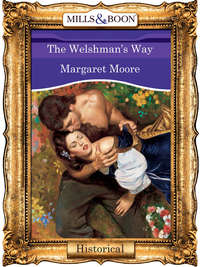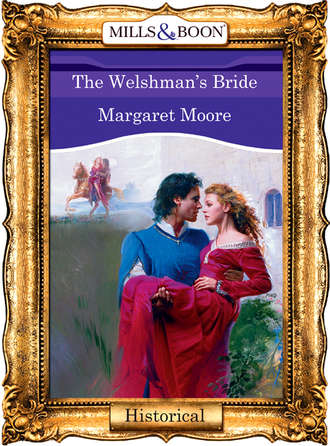
Полная версия
The Welshman's Bride
“Please, sit,” he offered, gesturing at the baron’s chair behind the large wooden table.
“I prefer to stand.”
Dylan shrugged, then he himself took the baron’s chair. At that, Lord Perronet looked even more irate, but Dylan didn’t much care. If the man insisted upon standing, so that now he looked like a humble penitent brought before the lord of the manor, he had only himself to blame.
Like his niece.
“You’ve dishonored her, so you’ve got to marry her,” Lord Perronet declared without further preamble.
“I did not, so I do not,” Dylan replied. “I don’t know what she told you, but I didn’t even know she was in my bed until you came barging into my chamber this morning. If there’s dishonor here, you cannot lay it at my feet.”
“It’s not your feet that ruined her,” Lord Perronet growled. “She was in your bed with blood on the sheets, man! That’s evidence enough for what you did.”
“That is evidence that somebody bled for some reason. Otherwise, it is my word against hers.”
“The word of my niece against that of a—”
“Bastard?” Dylan regarded him steadily. “I must say, my lord, I’m surprised you would insist I marry her, given your low opinion of my family.”
“You gave me no choice.” The nobleman’s brows lowered. “Perhaps that was your plan—to get her dowry as well as entry into my family.”
“If I did dishonor her, as you claim, those would be the furthest things from my mind. I don’t need her dowry, and I certainly don’t want to be related to you in any way.”
The nobleman’s frown deepened. “Then why did you do it? To destroy my allegiance with Kirkheathe?”
“I don’t give a fisherman’s fart for your allegiances,” Dylan retorted. “That’s a Norman for you, thinking only of power and gain.”
“You young—”
“Welshman,” Dylan interrupted.
If the man insulted him again, he was quite likely to lose what remained of his control over his temper, and that would be a mistake.
“Or rather,” Dylan continued, “happily more Welsh than Norman. Tell me, my lord, what does the lady say? Does she claim that I made love to her under promise of marriage?”
Lord Perronet didn’t hesitate a moment. “Yes.”
The bile rose in Dylan’s throat. Genevieve had lied as blatantly as any charlatan, making him bear the blame.
“She is but a weak-willed girl easily led astray by a honey-tongued young man.”
Dylan thought of Genevieve’s eyes before his passionate kiss.
She was no weak-willed girl; she was a woman, with a woman’s passion.
And a very adult capacity to lie without detection.
He rose and faced Lord Perronet. “Whatever I may or may not have done, I will not be blackmailed into marriage.”
For the first time, it finally seemed to penetrate Lord Perronet’s brain that Dylan could not be compelled to marry Genevieve under these, or perhaps any, circumstances.
“I hope you realize you’ve destroyed her chances,” he snarled. “There’ll be nothing for her but a convent—a secluded one.”
“That is not my concern.”
“No, it isn’t, is it?” Perronet demanded. “Just like your father, aren’t you? Don’t think about consequences—just so long as you get what you want! Greedy to the bone!”
“If you were wise, you would cut out your tongue before you spoke of my father again,” Dy-lan said quietly as he came out from behind the table.
Lord Perronet’s eyes filled with panic, and he took a step back.
“I am not the greedy one here, my lord,” Dylan continued in that same softly menacing tone. “What will you forfeit if the betrothal between your niece and Kirkheathe is broken? Money? Power? Influence? All three? Was there ever any thought of her happiness when you made that betrothal?”
Lord Perronet stepped back again as Dylan approached him like a lion stalking its prey. “Perhaps if you had thought of her, she would not have been driven to impugn my honor to avoid marrying against her will.”
“I...she...”
“You would sacrifice her happiness for your greed,” he accused.
“You...you impertinent—!” Lord Perronet spluttered.
“Watch your tongue, my lord! Or should I say, Uncle?”
The man’s eyes widened.
“Why look so surprised? Isn’t that what you came here demanding, that I should marry your niece? Anwyl, maybe I should. She wanted me, after all, so there is that to consider. And you are a rich, powerful man.”
“You wouldn’t dare!” Lord Perronet gasped.
“You seem to think I am capable of anything. Why not honorable marriage? Tell me, my lord, what might her dowry be?”
“It is—it doesn’t matter what it is! You will never see it!”
“This may be an appropriate time to point out that my own family is not insignificant,” Dylan said. “While I agree my father and grandfather were despicable monsters, my uncle and his sons are considered among the finest nobles in all of England. Baron DeLanyea is easily a match for you in powerful friends, as well as wealth. So you see, my haughty Norman, perhaps marriage to me is not to be considered a fate only slightly better than life in a secluded convent.
“Now, I ask you again, what is the lady’s dowry?”
Baron DeLanyea glanced at the entrance to the tower containing his solar, then back to the bread and ale before him as he broke the fast.
“God’s wounds, nerve-racking this is, and no mistake,” he muttered to his sons, who sat on either side of him.
“If he doesn’t part the man’s head from his body, it will be a miracle,” Griffydd observed.
“Then someone should go and make sure he doesn’t,” Trystan said, looking pointedly at his father.
“He won’t attack the man,” the baron said, although not without the merest hint of doubt in his voice. “He wouldn’t be that stupid.”
“He hasn’t proved to be very wise these days,” Griffydd remarked.
“That is true enough.”
Trystan stood abruptly. “Someone should see what they’re doing.”
“Sit down,” the baron ordered. “If we have to interfere, we will—but not unless it’s absolutely necessary.”
“He’ll make things worse, and hasn’t he done enough harm already?”
“He says he has not,” the baron reminded his younger son.
“I saw the way he looked at her,” Trystan replied. He looked at Griffydd. “You did, too. I know you spoke to him about his behavior.”
“And I thought he had taken heed.”
“He says he did,” the baron said. “He didn’t even talk to her at the banquet last night, did he?”
“That doesn’t mean he’s innocent,” Trystan charged.
“I know,” the baron replied. “But let us not be casting blame where it isn’t deserved.”
Suddenly, the older man straightened. “Shh! Someone’s coming from the solar now.”
All three watched expectantly as Lord Perronet strode out of the tower, through the hall and outside.
They exchanged puzzled glances.
“At least he’s not dead,” Griffydd offered.
“He looked angry, though,” Trystan noted warily. “What do you suppose—?”
They fell silent as Dylan appeared, his head bowed as if lost in thought, a scowl on his usually smiling face until he looked up and saw his relatives.
Then he grinned, but all realized there was no true joy in it. “Congratulate me, gentlemen. I am to be married.”
Griffydd and Trystan stared openmouthed as the baron slowly got to his feet. “What are you saying?”
“I am saying I am going to marry Genevieve Perronet. Today.”
The baron sat back down heavily.
“Why?” Griffydd demanded, eyeing him sternly. “You claim you did not dishonor her.”
Finally, a spark of mirth appeared in Dylan’s dark eyes. “Maybe it is because I am of an age to be married.”
“Are you certain this is a wise decision?” the baron asked. “Lord Perronet didn’t force—?”
“Him? Force me to do anything?” Dylan scoffed. “That would be something to see.”
“What about Lady Genevieve?” Trystan demanded.
“It was her idea, wasn’t it, although she went about letting me know that she wanted to be my wife in a rather unusual way,” he replied.
He turned to the baron. “You yourself heard her confess that she loved me, Uncle. Obviously, she is an intelligent woman and no one can deny her beauty.”
“You are absolutely certain about this?” the baron asked.
“Uncle, do you honestly believe I could be forced by any man—or woman, either—to marry against my will?”
“No,” the baron admitted.
“Griffydd?”
“No,” he agreed.
“Trystan?”
“No,” the youngest knight grudgingly concurred. His gaze mirrored the intensity of his father’s. “Do you love her?”
“Not yet, but I shall, beginning this very night. Now if you will all excuse me, I had better start arranging my wedding.”
He marched from the hall, whistling a jaunty tune as if he got married every day, leaving the other three feeling like men who had been expecting a pitched battle, only to find themselves sent home without so much as a glimpse of the enemy.
Below the table, Trystan’s hands balled into fists.
Genevieve stared at her uncle in disbelief. “My what?”
“Your wedding dress. Get it out and get it ready. You are going to be married today.”
“Married? To whom?”
He gave her a sour look. “To whom do you think? Sir Dylan DeLanyea, lord of Beaufort, that’s who.”
“But what of my betrothal to Lord Kirkheathe?”
“That is obviously at an end, thanks to you. I shall find some means to make amends. Maybe your cousin Elizabeth can be persuaded to marry him in your stead.”
“Uncle!”
Genevieve rose from her chair and faced him resolutely. “I admit I made a grievous error, but I will not compound it by marrying that man.”
“Oh, yes, you will!” her uncle replied harshly. “How dare you refuse? After what you did, you should be glad we’ve got a way out of it before your reputation is totally sullied. There will be rumors and gossip enough as it is. As for what Lord Kirkheathe might think, I don’t want to even consider. You should thank God I’m not sending you off without a shift to your name.”
“I would prefer that fate to marriage to Dylan DeLanyea.”
Her uncle looked at her as if she had gone mad. and clearly he thought she had. “You were in his bed naked, Genevieve!”
“To my everlasting regret. I would rather marry Lord Kirkheathe.”
“That’s impossible, and you know it! Marry DeLanyea, or so help me, I’ll send you to the most remote convent I can find and leave you there to rot!”
As she looked at his angry visage, she knew he would do exactly that. She would be exiled to an existence little better than a living death, with no husband and no possibility of children.
“Lord Petronet?”
Genevieve started and looked at the door, where the baron’s wife stood.
Lady Roanna was tall and slim, dressed in a simple gown of fine red wool girdled with a belt of soft beige leather. Her hair was covered by a red cap and white scarf.
She regarded them placidly, her pale, patient face showing signs of weariness, yet her voice, while soft, was as commanding as the baron’s.
Genevieve quickly curtsied. As she did so, she glanced at her proud and pompous uncle. He looked as humble and contrite as an errant child.
“Lord Perronet, I have been informed of my nephew’s impending marriage and would like to speak to your niece alone, if I may. One woman to another, as it were.”
When she spoke, her voice and expression were such that Genevieve doubted anyone would deny whatever request she cared to make, even including the king.
And as if to prove Genevieve’s observation, her uncle nodded, meek as a lamb.
“Of course, my lady,” he said. He went to the door, then hesitated, glancing back at Genevieve. “The ceremony will be at noon.”
After he was gone, Lady Roanna glided into the room.
“May I sit?” she asked, and Genevieve couldn’t help but be relieved by the change in her tone. She sounded much more sympathetic.
“Of course, my lady,” Genevieve replied.
Lady Roanna took a chair and then gestured at the other. “Please.”
Genevieve did as she was bid.
Lady Roanna turned her vibrant green eyes onto Genevieve, eyes that seemed to demand truthfulness. “So, you are going to marry my nephew, not Lord Kirkheathe.”
“I have been told I must,” Genevieve replied, and not without a hint of bitterness.
“You do not sound pleased.”
Genevieve didn’t answer. She couldn’t, not with Lady Roanna’s steadfast gaze on her.
“I gather your uncle has good reason for demanding this change.”
“I was in your nephew’s bed.”
Lady Roanna’s expression altered ever so slightly and in a manner that made Genevieve flush. “Dylan denies seducing you.”
All Genevieve could do was stare at the floor and blush like a child caught in an outrageous lie.
“Did he seduce you?” Lady Roanna asked gently.
Compelled by the older woman’s sympathy, Genevieve raised her eyes and shook her head. “No, my lady. And so I told my uncle.”
Lady Roanna smiled a little. “I see. I gather this was a plan on your part to avoid marriage to Lord Kirkheathe?”
Genevieve felt her eyes welling with hot tears as she nodded. Suddenly, she felt silly and stupid and ashamed.
“Then I would say you have succeeded admirably. But tell me, were you not consulted about the betrothal to Lord Kirkheathe? Did you not agree?”
“No, my lady. That is,” Genevieve amended, “I did not openly disagree. I thought I had no other choice, until I met Dylan.” Her voice quivered. “I suppose you think I have behaved disgracefully.”
The older woman reached out and pressed her hand warmly. “I think you have acted like a desperate young woman who believes herself in love. However, I must say I am surprised you are not happier at the prospect of marrying my nephew, since you must have suspected this would be the ultimate result of your scheme. Perhaps you have heard things about his family that have upset you?”
Although they had not been uppermost in her mind, Genevieve remembered the epithets her uncle had hurled at Dylan and his hostile reaction. “I know my uncle thinks very poorly of his father and grandfather, but I do not know why.”
Lady Roanna sighed deeply. “Dylan’s father and grandfather were selfish, cruel, vindictive men who craved power. They did terrible things trying to attain it. Thankfully Dylan is not like them.”
“My uncle called him a bastard.”
“He is. His mother was a servant girl at Beaufort.”
Genevieve frowned, confused. “Yet he has inherited that estate?”
“Yes.” Lady Roanna made a wry little smile. “The Welsh are not as concerned with legitimacy, and it is a good thing, too, or my husband would not be lord of Craig Fawr. He is a bastard, too.”
“Oh, my lady, I’m sorry. I didn’t know.”
“There is no need to apologize. I just thought you might hold Dylan’s birth against him.”
“No, that is not what I hold against him,” she replied.
She mustered her pride. “I was most unhappily misled, my lady. I thought he loved me.”
“Why?”
Genevieve was not quite prepared for the blunt question, but if Lady Roanna wanted to know, she would tell her. “He was very kind and pleasant, and flattering. No man has ever looked at me as he did. And then he kissed me, more than once, with great passion. And when he said farewell...”
Her words trailed off into an awkward silence, for if she said more, she would perhaps reveal too much of her own wounded feelings, and that her pride would not allow.
“I understand he never told you that he loved you and wanted to marry you.”
“No, my lady. But his embraces were...they gave me some cause to think he cared for me.”
“Dylan is a passionate man,” Lady Roanna observed. “He sometimes acts without much thought.”
“Did he agree to marry me because my uncle forced him?” Genevieve demanded suspiciously.
Lady Roanna smiled. “If I did not know Dylan better, my dear,” she admitted, “I might think that But I do know him. No one could force him to do such a thing.”
“Then why did he change his mind and say he would marry me?”
“I honestly don’t know,” Lady Roanna replied. “But he does seem very determined to do it.” She leaned forward, her gaze searching Genevieve’s face. “What I must know is, do you want to be his wife? If you do not, tell me. Neither my husband nor I believe in forced marriages.”
A strange look crossed Lady Roanna’s face. “For very good reasons. So, if you would rather not marry Dylan, just say so and it will not be.”
“My uncle threatens to send me away to a remote convent if I do not,” Genevieve replied warily.
“We would convince him otherwise.”
Despite Lady Roanna’s calm conviction, Genevieve found it difficult to believe they would be able to change her stubborn uncle’s mind.
So now it was up to her to decide: marry Dylan DeLanyea, who only hours ago had made it very clear that he did not want her for his wife.
Or be sent to a convent, forever unmarried and childless.
Chapter Four
Somewhere in the dim recesses of Dylan’s mind, he had always known he would marry one day. He had, however, envisioned doing so under distinctly different circumstances.
Whenever he had taken a moment to contemplate his future spouse, for example, he had pictured a spirited Welsh woman of voluptuous build who would understand about his children and the women who had borne them.
He had certainly never imagined himself married to a pale, blond girl-woman of Norman blood, especially one who had tricked her way into his bed, he reflected as he stood in the hall with his relatives, along with the baron’s assembled guests and the castle servants.
They were all awaiting the arrival of his bride and the blessing of a priest hastily summoned.
He had also naturally assumed he would be passionately in love with his bride, a passion beyond anything he had ever felt for the many and various women who had already shared his affection and his bed.
Genevieve Perronet was attractive, of course, and she had been arousing—but he did not love her. Anwyl, he hardly knew her.
And therein, of course, lay the biggest problem. Angry and frustrated, he had proposed a marriage with scarcely a thought of the bride-to-be, his primary motive being to annoy her haughty, pompous uncle.
At least Genevieve would be pleased, he consoled himself, his natural optimism reasserting itself. She would be grateful that he was marrying her and saving her damaged honor.
And she had said she loved him.
A grateful, loving wife with a dowry of five hundred gold coins was not something to be dismissed out of hand. As for his children, he would simply have to explain to her that the Welsh were not so hypocritical when it came to illegitimate children. In Welsh eyes, a child was a child, whether born in wedlock or not.
If he and Genevieve had a son, that firstborn son would inherit Beaufort according to Norman law. Trefor, his eldest son out of wedlock, would be given his own land out of that estate, as would his other bastard son, Arthur, equal to that of any subsequent issue.
Genevieve would simply have to accept that.
The baron, standing beside him, shifted, drawing Dylan’s attention from his own musings. Glancing around the hall, Dylan realized the guests and servants were exchanging wary glances.
“Brides are often late,” the baron muttered. “Wanting to look their best, is all. You know how women are.”
Dylan nodded. Yes, he knew women, and so he would be patient. “Will Lady Roanna be here for the blessing?”
“Old Mamaeth is very bad but—” the baron started to explain when suddenly there was a commotion at the entrance to the hall.
Dylan found himself holding his breath, then, when he saw the reason for the disturbance, letting it out slowly.
It was Lady Roanna and the baron’s old nurse, who was being carried in, seated on a chair borne by two brawny servants as if she were an Oriental potentate.
“Not missing this,” the elderly woman chirped cheerfully. “It’s about time that young devil settled down and got married and quit sowing his seed all over Wales.”
Dylan tried to smile. He was happy Mamaeth had made the effort to see him wed, of course, and happier yet to see Lady Roanna, who was like a mother to him.
But Mamaeth had a tongue that wagged, especially when she was in a celebratory mood, and no sense of propriety at all.
Which she proceeded to demonstrate.
“Where’s the bride?” she demanded querulously. “Not changed her mind, I hope, after all the uproar! Nearly stopped my heart, that.”
The people in the hall smiled, but the smiles were a little strained.
“It is a good thing she is taking her time,” Dy-lan replied with a merriment he didn’t quite feel. “Otherwise you would have been late.”
“Humph!” was all the answer Mamaeth could think to make to that before she subsided into an uncharacteristic silence, and for that, Dylan was grateful.
“Ah, here they are!” the baron cried softly.
Again Dylan looked at the entrance to the hall—and then gasped with delight.
Genevieve wore a gown of white silk whose long cuffs, lined with gold samite, reached nearly to the floor. Over this was a tunic, also of gold. Her girdle of gold and silver embroidery encircled her slender waist, crossed in back and was knotted again in front, so that it fell low on her hips.
Her hand on her stern uncle’s arm, she slowly approached the group waiting on the dais, and as she did, her low-slung girdle seemed to highlight the graceful sensuality of her walk.
Surprisingly aroused, especially given the crowd surrounding him, Dylan swallowed hard and forced himself to look at her face. On her head was a stiffened band with matching embroidery held in place by a white silken scarf that passed from one side of the crown under her chin to the other.
Without the cluster of golden curls that usually surrounded her face, she looked older, and more womanly.
His heart beat faster.
Then she came near enough for him to get a good look at her expression.
Rarely had he ever seen anyone, including Griffydd, appear so grimly resolute. She looked more like a condemned prisoner being led to the block than a woman who had connived to bring about her own marriage.
If she did not want to be married to him, why was she there?
Confused, and with his pride wounded—for never had he imagined his bride would have such a look on her face—he glanced at Lady Roanna He knew she had spoken with Genevieve. Perhaps Genevieve had given his foster mother some inkling...?
Lady Roanna smiled tranquilly, as if this were nothing more than a joyous occasion and she glad to be there.
Surely she would not look so calm if she thought there was trouble in the offing.
Next, Dylan glanced at the baron, who had a somewhat troubled frown on his face, and his sons likewise.
Dylan grew aware of the puzzled murmurs of the assembly, and the various expressions of the guests, who generally seemed to be regarding him with a certain questioning gravity, and Genevieve with...pity?
Anwyl, this was her doing. Her fault. The result of her scheming and trickery. He would have no one think this was being forced on her!
Or him, either, his pride reminded him.
So Dylan left the dais and approached his beautiful, scheming bride. When he reached her, he yanked her into his arms, and boldly and passionately kissed her.
Dylan’s unexpected kiss quite took Genevieve’s breath away—and threatened to strip her of what dignity she retained in front of all these people.
Try as she might to feel nothing, or perhaps only anger, the moment his lips were on hers, her blood began to throb wildly, and her knees felt strangely weak.
Finally he stopped kissing her, although he still held her in a grip of iron. His lips trailed across her cheek toward her ear while she tried to catch her breath.


